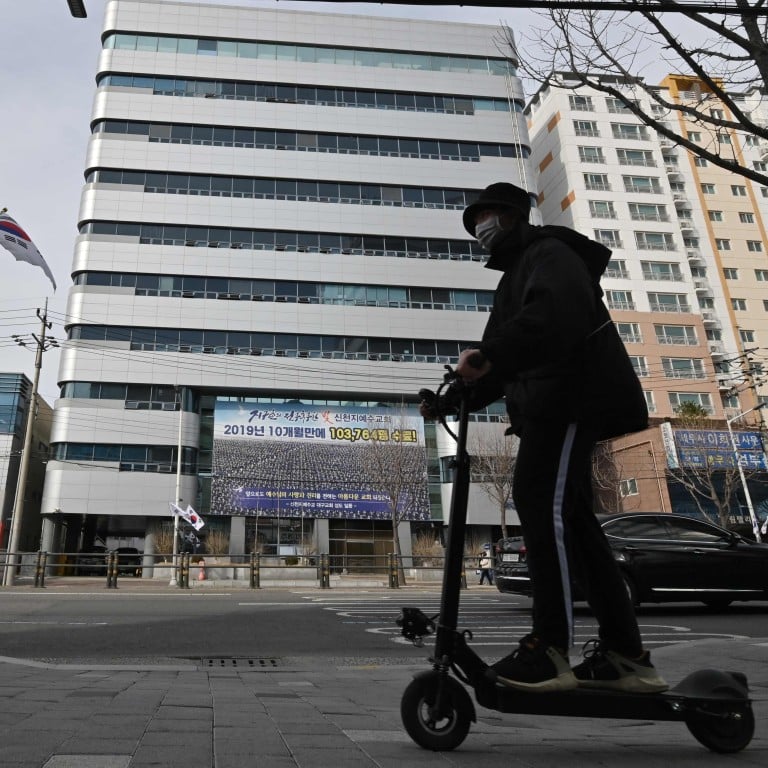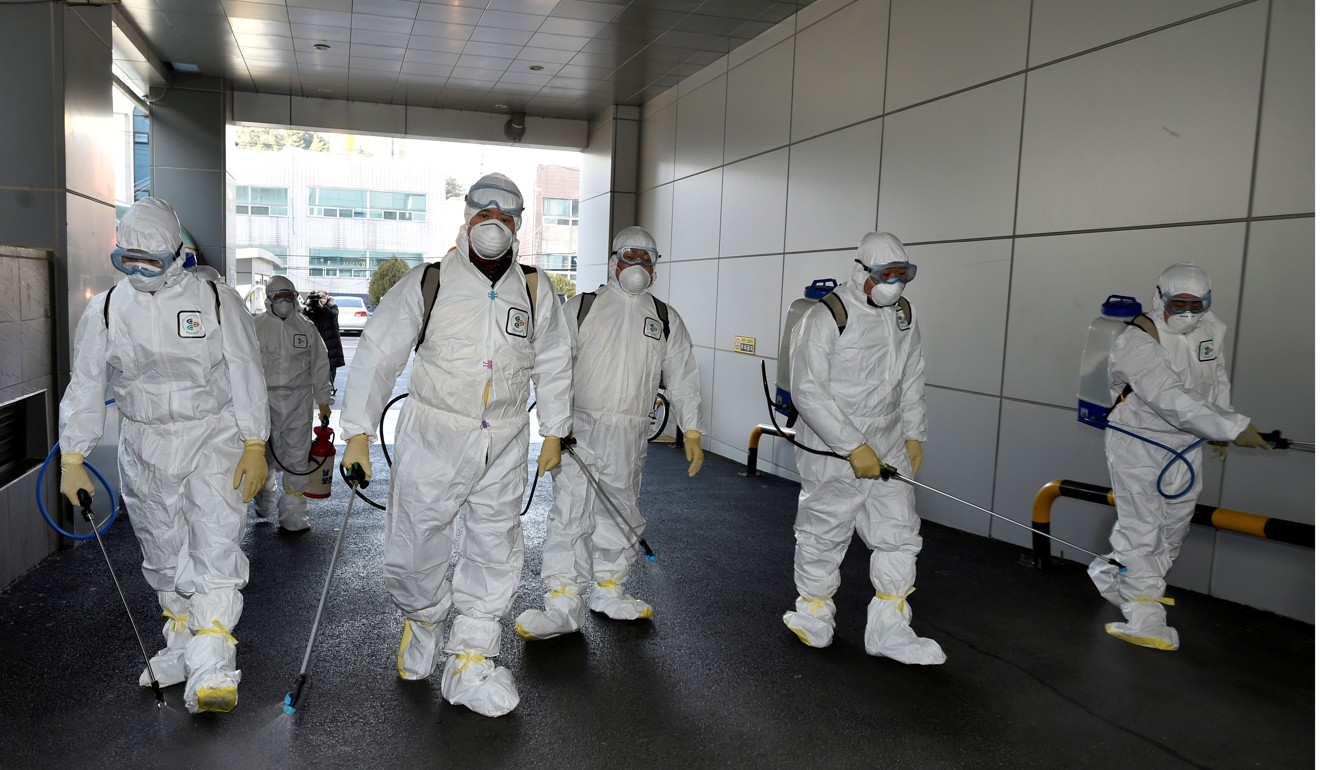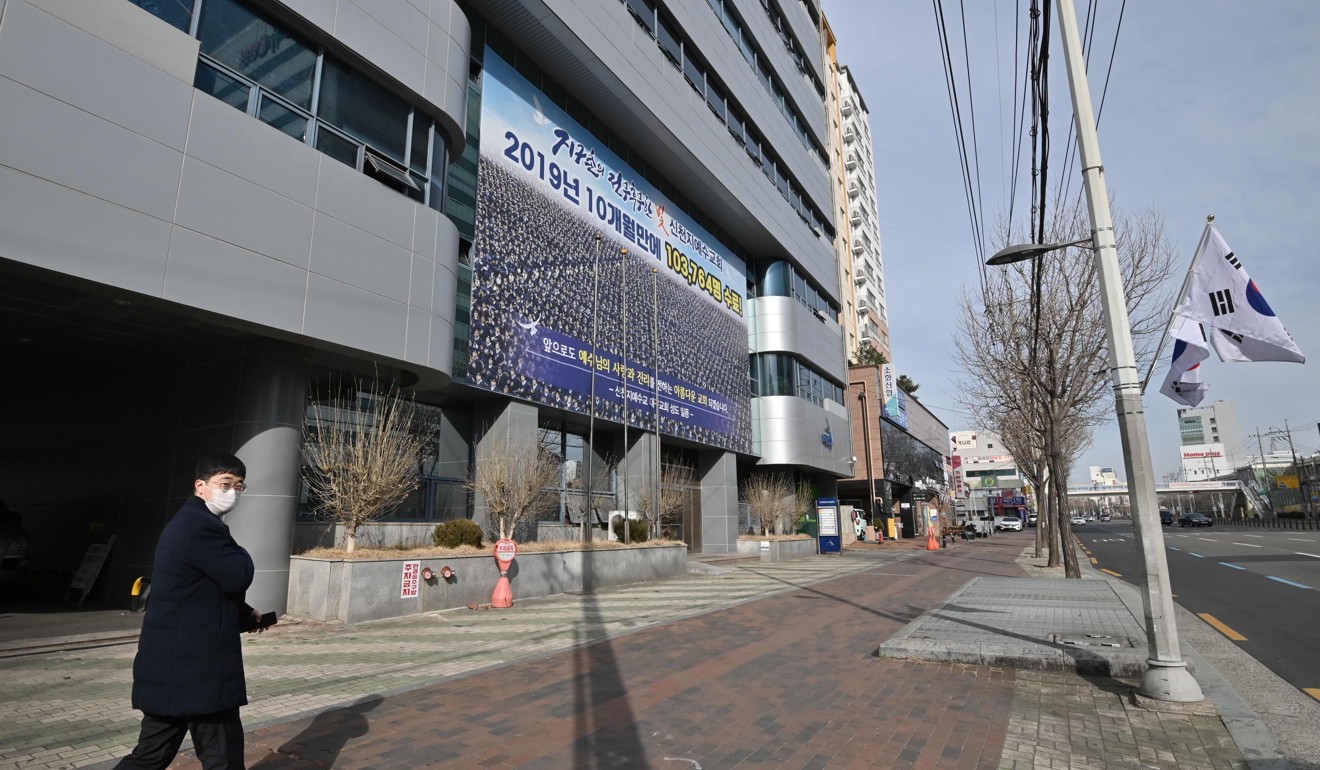
Coronavirus: in South Korea, mounting anger, rumours over Shincheonji church as cases rise
- The spike in Covid-19 cases has heightened interest in the controversial church, which accounts for over half of the country’s infections
- Anger and mistrust reached a peak when an online post detailed its alleged plans to infiltrate traditional churches to spread the virus
This came as the South Korean government on Wednesday said it had finally received a directory of all 210,000 members of the religious group, after several days of discussions with its leaders.

South Korea currently has the second-highest number of confirmed cases of Covid-19 in the world, with over 1,500 infected as of Wednesday evening. The spike in cases has heightened interest in the religious group and has shed new light on its leader, members and religious practices.
Exclusive | China screening South Korean sect members for coronavirus
Established in 1984 and seen by mainstream churches as a cult, followers believe the group’s founder, Lee Man-hee, to be the second coming of Jesus who will bring restoration to the world. Members are mostly known to the public for trying to evangelise pedestrians by acting like students trying to conduct surveys. But attitudes towards the church have become more critical as the outbreak among Shincheonji members dominates news cycles and spreads fear and anger.
One netizen commented: “As the day care centre has taken a break for an indefinite amount of time, I don’t know if both of us can continue to work as one of us needs to tend to the children at home … We are barely making it as it is … I feel resentment towards the woman from the Daegu church.”
The woman identified as the “super-spreader” at the Daegu branch of the church, which has 9,336 members, was accused of initially refusing to be tested for Covid-19 after she showed symptoms of a high fever when she was hospitalised earlier in the month.
Another internet user commented that the religious group was “being rightfully criticised as they haven’t turned in any of their member directories at a time when the situation is this severe”.
Government authorities could not trace all the members who visited the Shincheonji church in Daegu from other regions as the religious group was initially uncooperative in turning in their member directories and contact lists to health authorities.
As hundreds of confirmed cases came out of the religious group over the week, government officials in Gyeonggi province forcibly entered Shincheonji’s headquarters in Gwacheon to obtain its member list. It finally received the directory on Wednesday.
Exclusive | Secretive South Korean sect held meetings in China’s epidemic epicentre
Additionally, more than 600 members of the Daegu church could not be reached by phone.
A 27-year-old woman who became the first confirmed case in Yongin, just south of Seoul, was caught lying to her family and government authorities about not visiting the Daegu church. Surveillance cameras caught her entering the church last week.
By spreading the virus to regular churches, Shincheonji is trying to quell the exposure that it is currently receiving.
Anger and mistrust at Shincheonji reached a peak when an online post detailed the group’s alleged plans to infiltrate traditional churches. A pastor at one of these churches wrote that a whistle-blower from inside Shincheonji had tipped him off that members were being ordered to spread the coronavirus to other churches.
“When I first heard about this so-called rumour, I believed that it was 100 per cent true,” said Kim Ha-jung, a woman in her fifties who was a member of Shincheonji in its early days in the 1990s. She used a pseudonym out of fear that the group would find her again.
“By spreading the virus to regular churches, Shincheonji is trying to quell the exposure that it is currently receiving,” she said. “They’re afraid their lies will all come out in public.”
South Korea’s 9.68 million Christians are on high alert, with some mega-churches, including Yoido Full Gospel Church in central Seoul, which is the country’s biggest with 560,000 church-goers – cancelling all church functions except Sunday services for over a month.
While many churches have substituted their Sunday services for an online streaming service, churches that were open on Sunday drastically increased security measures at their doors. At many of these churches, only registered members were allowed inside while new members were asked to visit the church in two weeks’ time.
Coronavirus cases in South Korea rise to 1,595
A church in Suwon, a city just south of Seoul, reported to Kukmin Ilbo that it had caught two people who appeared to be Shincheonji members. One man was questioned after being identified as an unregistered member. He ran away after a church administrator tried to take a picture of him. Another man who was caught inside the church building was identified as a Shincheonji member who had visited the church on numerous occasions in the past.
Hwang Euy-jong, the head of the Korea Christian Cult Counselling Centre in the Yeongnam district, said such rumours should be taken seriously by traditional churches.
“Such commands would not be anything out of the ordinary for a group that has carried out covert activities for all of its existence,” said Hwang.
“I know cases where 200 Shincheonji members were sent out undercover to a traditional church with 10,000 members, and the church later crumbled.”

Kim, the woman who was a member of Shincheonji for 13 years, said every member of the religious group is encouraged to blend in with worshippers at traditional church services.
“The goal is to act like perfect human beings to start making relationships with people in the congregation,” said Kim.
“After concentrating on a member of the church from anywhere between a year to three years, we lead the regular church goer to meet an administrator from Shincheonji.”
Coronavirus: leading Korean health official is member of church at epicentre
Na Su-ah, an alias, is another former Shincheonji member who lives in the currently beleaguered city of Daegu. She messaged a friend who is still a member of the religious group after news broke out about the church cluster.
“My friend texted me that news about the coronavirus was propaganda that was attempting to slow down the development of Shincheonji,” said Na.
According to Yonhap News, Lee Man-hee, the leader of the religious group, announced to his followers via a communication application that “the recent disease was a temptation by the devil to test our faith”.
The religious group has warned that any person caught spreading false news about Shincheonji or impersonating a member of the religious group will be met with legal action.
“Don’t slander them,” commented one netizen about the religious followers. “Think about the act of condemning those who are unable to think rationally.”

